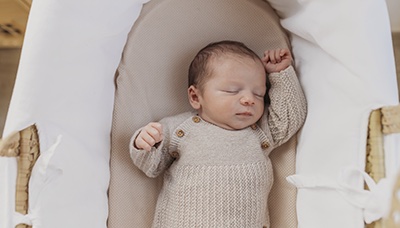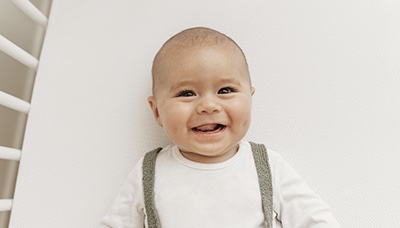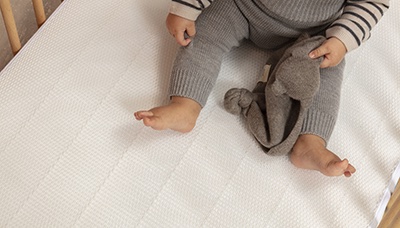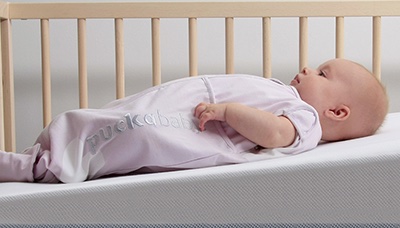Some babies sleep more than others. Explore with us the wondrous world of biological and neurological factors that influence babies’ sleep to get a better grasp of your newborn’s sleep.
Yes you can! By using some insight below.
Did you know that our body produces some hormones that make us want to sleep non-stop, and others that counteract this? These hormones are melatonin (the sleep hormone) and cortisol (the stress hormone). The relationship between the two regulates our circadian rhythm or biorhythm.


Melatonin
Newborns can’t make their own sleep hormone. In the first 3 weeks after birth, they are dependent on the melatonin that was supplied by their mother in the womb. But at some point, this supply runs out. By around 6 to 8 weeks, they start to produce their own melatonin.
Sleeping without melatonin
Babies between 3 to 6 weeks old do not have any sleep hormone in their body. Your baby evolves from a tiny creature that sleeps almost around the clock to a slightly bigger creature that appears to need no sleep at all.
Are you at your wit’s end yet? Remember that this is just a stage in your baby’s life, that it is the consequence of biological processes, and that things will get much better after a few weeks. Once your baby starts to produce their own melatonin, they will fall asleep more easily again and develop a circadian rhythm.
The calming reflex: helping your newborn sleep
Although babies are unable to self-soothe and fall asleep on their own during the first 4 months, there are ways that parents can help their newborn sleep. Trigger the calming reflex to help your baby fall asleep:
- Swaddle your baby
- Rock your baby to sleep
- Use white noise or soothing sounds.
These three elements mimic your baby’s life in the womb, which is why they have such a soothing effect on babies during the first months. Triggering your baby’s calming reflex is not an exact science: some babies fall asleep more easily than others. In any event: give your child the time! Try to soothe your baby for a few minutes at a time. That way they can adapt to changing circumstances, relax and fall asleep.
Catnaps
Between 6 to 8 weeks, babies take lots of catnaps. Their body is just starting to produce its own melatonin but it takes some time for this process to kick in properly.
Unfortunately, these short naps are not always enough for your baby. Your baby may still feel tired, but not tired enough to trigger the urge to sleep.
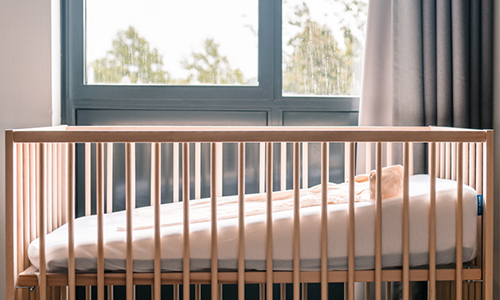

The outcome? A baby that is a tad grumpy due to a lack of restorative sleep. Keep soldiering on, as their biorhythm is just starting to emerge.
You can help your baby by letting them nap in a dark room. Melatonin is produced in response to darkness. Your newborn will sleep better, and when they are awake they will be more awake!
The effect of cortisol on babies’ sleep
What about cortisol? How does the stress hormone influence your baby’s sleep? Cortisol curtails melatonin production. Therefore it may help to give your baby some quiet time before bed, especially as they get older. That way you reduce their stress levels and their body can start to produce sleep hormone. Make this a quiet, enjoyable activity, so that your baby gets all the attention they need and can then sleep through the night alone.
What about the sleep cycle of babies?
Like adults, babies also go through sleep cycles. Whereas our sleep cycle is between 90 and 120 minutes, that of babies is only half as long: between 40 and 50 minutes. So you can see why babies wake up more often than adults.
Babies' sleep cycles
The average sleep cycle of your newborn lasts about 47 minutes. During this time, your baby goes through different stages.
- Drowsiness: your baby is dozing during the first 10 minutes. Their eyes may open and close, they may squirm or shake their head... During this stage, you should leave your baby alone because any stimulus may prevent them from falling asleep.
- Light sleep: once your baby has dozed off, they will sleep very lightly for the first 10 minutes. They may startle or jump at the slightest sound.
- Deep sleep: after 20 minutes your baby is fast asleep. They may sigh or the startle reflex may kick in. If you’re unlucky, this reflex may cause your baby to wake, however. Deep sleep is restorative, and the most important stage in the sleep cycle.
- Light sleep again: your baby sleeps more lightly at the end of the sleep cycle. During this stage your baby wakes up more easily again, but it is possible that they may move seamlessly from one sleep cycle to another.
Helping your newborn sleep? It can!
Use your newly-acquired insights about sleep patterns to help your baby sleep:
- Trigger the calming reflex.
- Follow the sleep cycle.
- Let your baby sleep in a dark room to promote melatonin production and make sure they also get some quiet time before bed.





